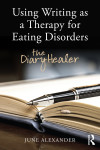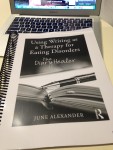The Diary – patriot or traitor
The Diary – patriot or traitor

 Diary writing may seem a simple self-help tool, requiring only pen, paper and time. However, the unwary diarist may become entrapped in self-defeating thoughts and anxieties, and be swept away in a sea of self-sabotage and self-doubt. Certainly, I did. For years. And years.
Diary writing may seem a simple self-help tool, requiring only pen, paper and time. However, the unwary diarist may become entrapped in self-defeating thoughts and anxieties, and be swept away in a sea of self-sabotage and self-doubt. Certainly, I did. For years. And years.
My ‘Self’ became lost in the ocean that was the eating disorder. Regimented lists of rules that focused on calories, exercise and weight seemed to ease anxiety momentarily, and such rules were the only ‘tool’ I had, to help stay afloat; to battle through each day.
I wrote the rules in my private diary, over and over again. Always breaking them. Always. Of course. Always loathing my self for being so weak. Of course. No matter how hard I tried, no matter how much I applied ‘self’ discipline, in the form of food limitations and exercise ‘programs’, I failed. I failed ‘Me’.
Every time I failed, I connected more with the eating disorder that was steadily entrenching itself in my brain, and disconnected my body more from my Self. I was unaware of this process. But my diaries provide the evidence; they stand on my book case as stark testament to it.
I felt shocked when, after a lot of help from health practitioners, I reconnected with ‘Me’ and reality dawned: my friend and confidante, the diary, had helped me to survive, from age 11, but it also had helped to tear me apart, keep me prisoner.
Integrate or Disintegrate
The distancing effect that writing may have for a person who is struggling with inner anxieties is double edged – it can exacerbate dissociation from one’s own body and personal control, or it can illuminate new understandings.
In an oral presentation at the Australian and New Zealand Academy of Eating Disorders annual conference, August, 2015, I drew upon an auto-ethnographic analysis to reveal that diary writing is indeed a complex art.
In my life, I said, the diary had been both a constructive and destructive tool in the early years of a 40-year struggle with Anorexia Nervosa.
It is only recently that I came to learn that diary-writing techniques can assist in achieving reconnection with authentic Self, and that the diary offers an opportunity to be both life participant and observer. To be an ongoing self-healer. With guidance, to be a patriotic friend of Self, for life.
The Diary as Healer
Findings in Using Writing as a Therapy for Eating Disorders – the Diary Healer (my new book, to be released in 2016) indicate that, despite its dangers, guided diary writing can act as a lifebuoy between person and therapist.
It can help bring the patient to shore, away from pull and bullying behaviours of the eating disorder and enable us to stand safely, serenely and confidently on firm ground, our body and self re-integrated as one.
I extend deep appreciation to the many people who have contributed expertise, life experience, together with compelling diary extracts, to The Diary Healer, which also has become the creative component in my PhD in Creative Writing. The manuscript is now in the care of my publisher, Routledge, and I look forward to keeping you posted with updates in the New Year, during this next stage of the book-making process.
This post is drawn from:
Can diary writing facilitate recovery: an auto-ethnography analysis
- ANZAED 2015 “Riding The Waves To Recovery” Conference abstracts published in the Journal of Eating Disorders. Published: 23 November 2015
- Also: Alexander et al. Journal of Eating Disorders 2015, 3(Suppl 1):O29 And pdf.





